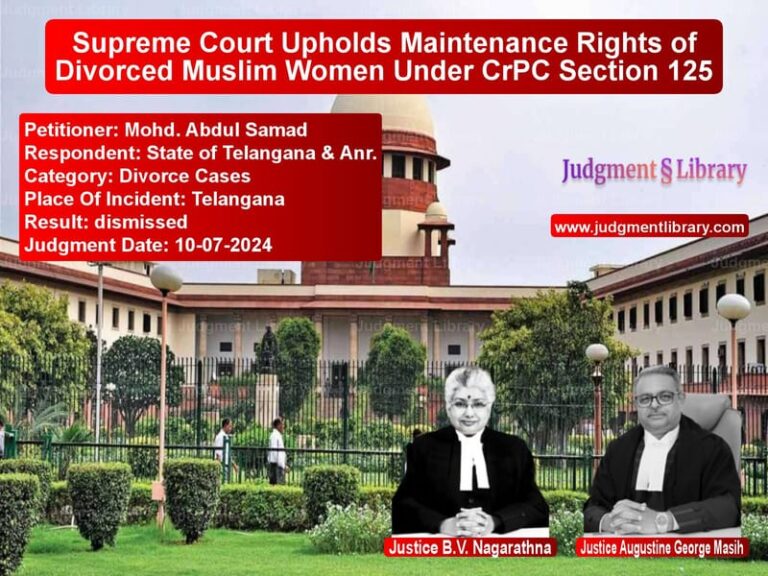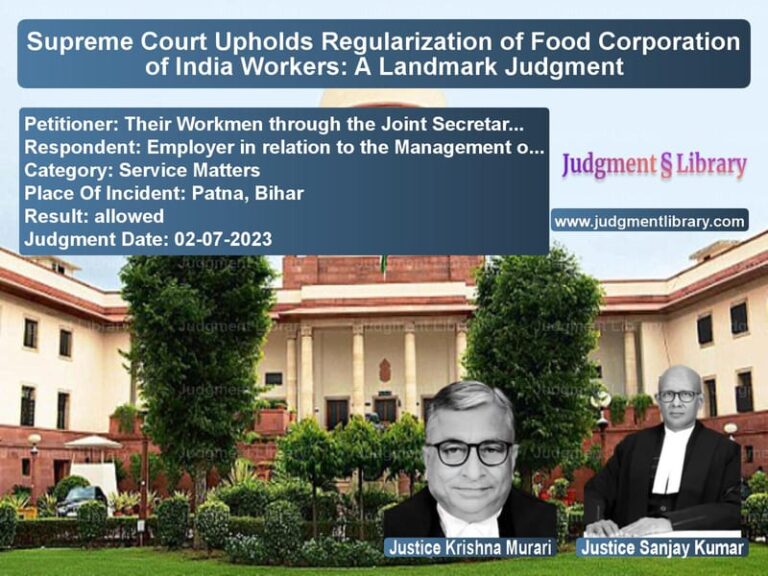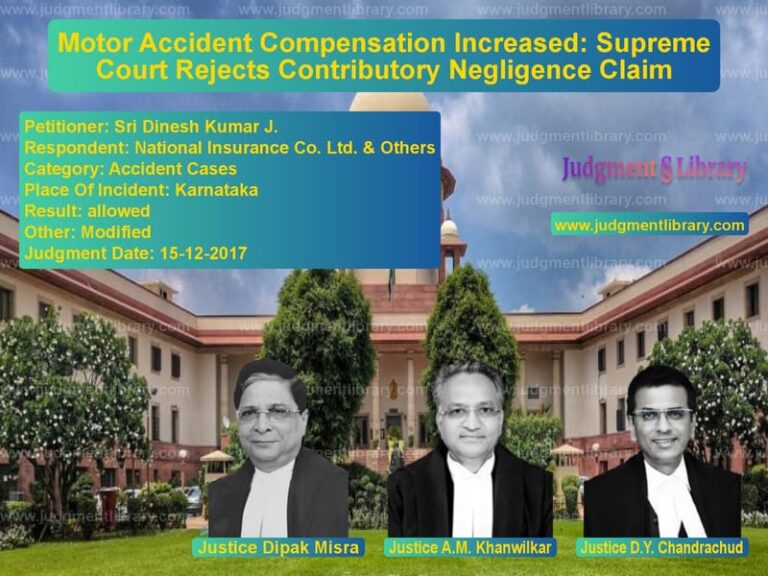Dispute over Genuineness of Tenancy: Sanjivkumar Surajprakash Aggarwal vs. State Bank of India
The case of Sanjivkumar Surajprakash Aggarwal vs. State Bank of India & Ors. involves a legal dispute regarding the genuineness of a tenancy agreement between the appellant and the third respondent. The main issue at hand is whether the tenancy created in favor of the appellant was a sham or legitimate. The Supreme Court addressed this matter in the context of the Securitization and Reconstruction of Financial Assets and Enforcement of Security Interest Act (SARFAESI Act), and directed that the issue be adjudicated by the Chief Metropolitan Magistrate in Mumbai.
The Court’s judgment provides important guidance on the handling of disputes related to tenancy under the SARFAESI Act and the necessity of an inquiry by the Magistrate to determine the authenticity of the tenancy agreement.
Background of the Case
The dispute arose when Sanjivkumar Surajprakash Aggarwal (the appellant) entered into a tenancy agreement with the third respondent concerning a property. The State Bank of India, one of the respondents, contested the tenancy, arguing that it was a sham and not a genuine transaction.
The issue came before the Supreme Court when the appellant sought judicial intervention regarding the tenancy’s validity and its impact on proceedings under the SARFAESI Act. The Bank had already initiated proceedings to take possession of the property, and the appellant challenged the legitimacy of these actions based on the tenancy agreement.
The Supreme Court noted that no adjudication had taken place on whether the tenancy was genuine, which led to the Court’s decision to remand the case for further inquiry.
Key Legal Issues
- Whether the tenancy agreement between the appellant and the third respondent was a legitimate transaction or a sham.
- Whether the issue of tenancy can be adjudicated under the SARFAESI Act before the Chief Metropolitan Magistrate.
- Whether the parties should be allowed to present evidence to prove the genuineness of the tenancy.
Arguments by the Parties
Appellant’s (Sanjivkumar Surajprakash Aggarwal) Arguments
- The tenancy agreement between the appellant and the third respondent was legitimate and should be recognized.
- There was no legal basis to consider the tenancy a sham, and the appellant was in lawful possession of the property.
- The Chief Metropolitan Magistrate should adjudicate on the matter to determine the authenticity of the tenancy.
Respondent’s (State Bank of India) Arguments
- The tenancy agreement was a sham and created solely to obstruct the Bank’s rights under the SARFAESI Act.
- The Bank had the legal right to take possession of the property, and the tenancy should not interfere with this process.
- The Bank sought the dismissal of the appeal and urged the Court to uphold the actions under the SARFAESI Act.
Supreme Court’s Judgment
The Supreme Court granted leave to appeal and ruled that the matter required a fresh inquiry. The Court observed that the issue of whether the tenancy was legitimate had not been addressed by any court, and therefore, it should be adjudicated properly. The Court directed that the Chief Metropolitan Magistrate in Esplanade Court, Mumbai conduct the inquiry into the genuineness of the tenancy.
“In our opinion, an inquiry, with the participation of the appellant, would be in the fitness and fairness of adjudication. Therefore, this appeal is disposed of, directing the Magistrate to conduct an inquiry with regard to the genuineness of the tenancy created by the third respondent with the appellant.”
Key Observations by the Court
- The dispute regarding the tenancy’s legitimacy had not been fully adjudicated, and it was essential to conduct a thorough inquiry.
- It was in the interest of fairness that the appellant be given the opportunity to participate in the inquiry.
- The Chief Metropolitan Magistrate was directed to conduct the inquiry and complete the proceedings expeditiously within one month.
- The inquiry would not interfere with the Bank’s ability to proceed against the landlord as per the law.
Final Judgment
The Supreme Court disposed of the appeal with the following directives:
- The Chief Metropolitan Magistrate was directed to conduct an inquiry regarding the genuineness of the tenancy.
- The parties were ordered to appear before the Magistrate on August 1, 2016.
- The Magistrate was instructed to complete the inquiry and conclude the proceedings within one month.
- The pendency of the inquiry before the Magistrate would not stand in the way of the Bank proceeding against the landlord in accordance with law.
- The appeal was disposed of with no costs.
Legal Precedents and Implications
This ruling is significant in the context of tenancy disputes and enforcement of property rights under the SARFAESI Act. The Court’s decision to allow an inquiry reflects a careful balance between the rights of property owners and the bank’s authority under the SARFAESI Act.
The case follows the precedent set in Hindustan Steel Limited vs. State of Haryana, where the Court allowed for inquiries in similar disputes before a Magistrate. It also aligns with the principle that any dispute concerning tenancy that affects the enforcement of property rights must be examined thoroughly, ensuring justice for all parties involved.
Conclusion and Legal Impact
The judgment reinforces the need for judicial fairness and transparency in property disputes. It emphasizes that:
- Disputes concerning the legitimacy of tenancy agreements must be resolved through a fair inquiry process.
- Property owners and financial institutions must adhere to legal processes and respect each other’s rights.
- Parties in a dispute should be given the opportunity to present their evidence and arguments before a competent authority.
The Court’s decision to transfer the matter to the Chief Metropolitan Magistrate ensures that the inquiry will be conducted with due process and in a timely manner, fostering a fair and just resolution for all involved.
Judgment delivered by: Kurian Joseph, Rohinton Fali Nariman
Judgment Date: June 30, 2016
This case sets an important precedent for handling tenancy disputes and the enforcement of property rights in the context of the SARFAESI Act.
Don’t miss out on the full details! Download the complete judgment in PDF format below and gain valuable insights instantly!
Download Judgment: Sanjivkumar Surajpra vs State Bank of India Supreme Court of India Judgment Dated 30-06-2016-1741872491346.pdf
Direct Downlaod Judgment: Direct downlaod this Judgment
See all petitions in Property Disputes
See all petitions in Contract Disputes
See all petitions in Damages and Compensation
See all petitions in Judgment by Kurian Joseph
See all petitions in Judgment by Rohinton Fali Nariman
See all petitions in dismissed
See all petitions in Remanded
See all petitions in supreme court of India judgments June 2016
See all petitions in 2016 judgments
See all posts in Civil Cases Category
See all allowed petitions in Civil Cases Category
See all Dismissed petitions in Civil Cases Category
See all partially allowed petitions in Civil Cases Category







